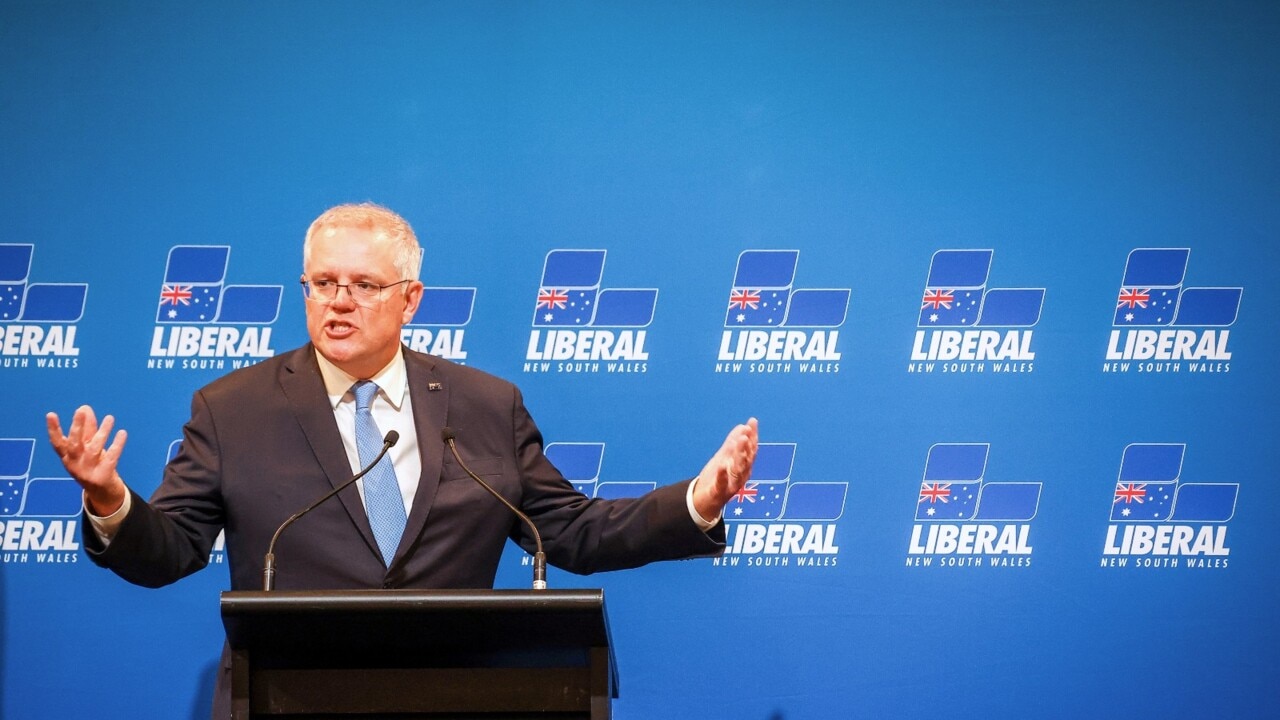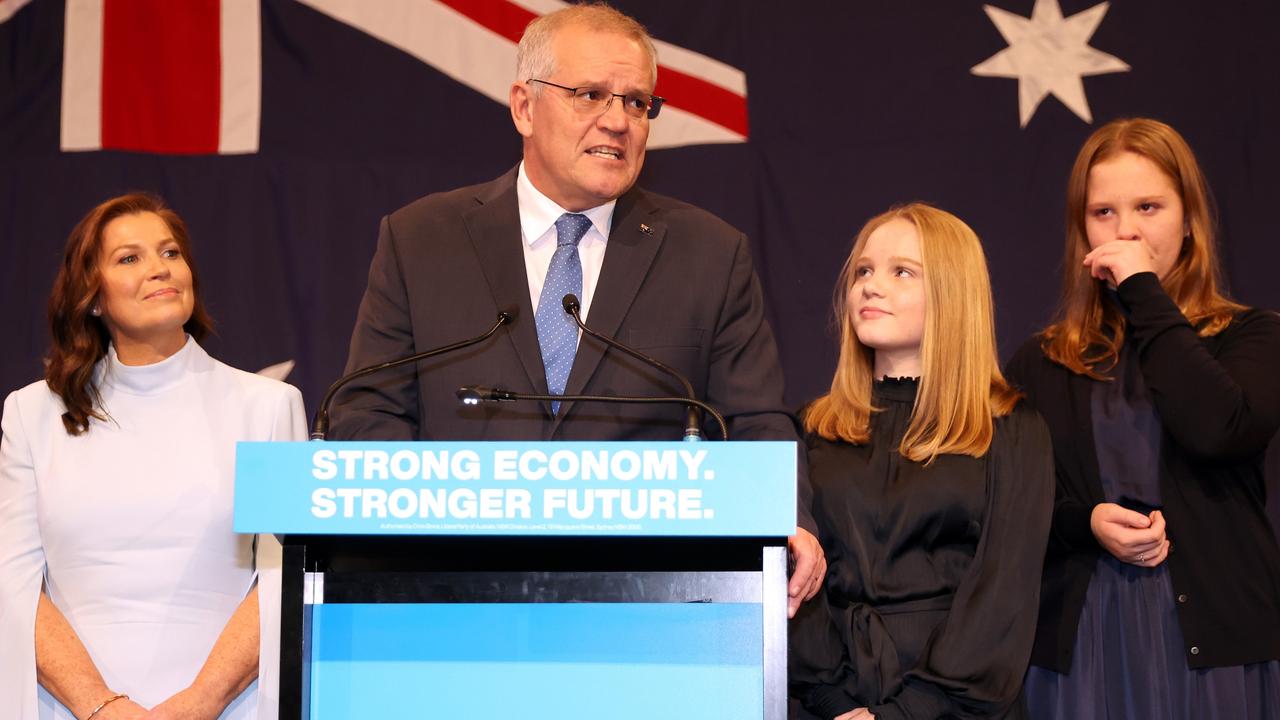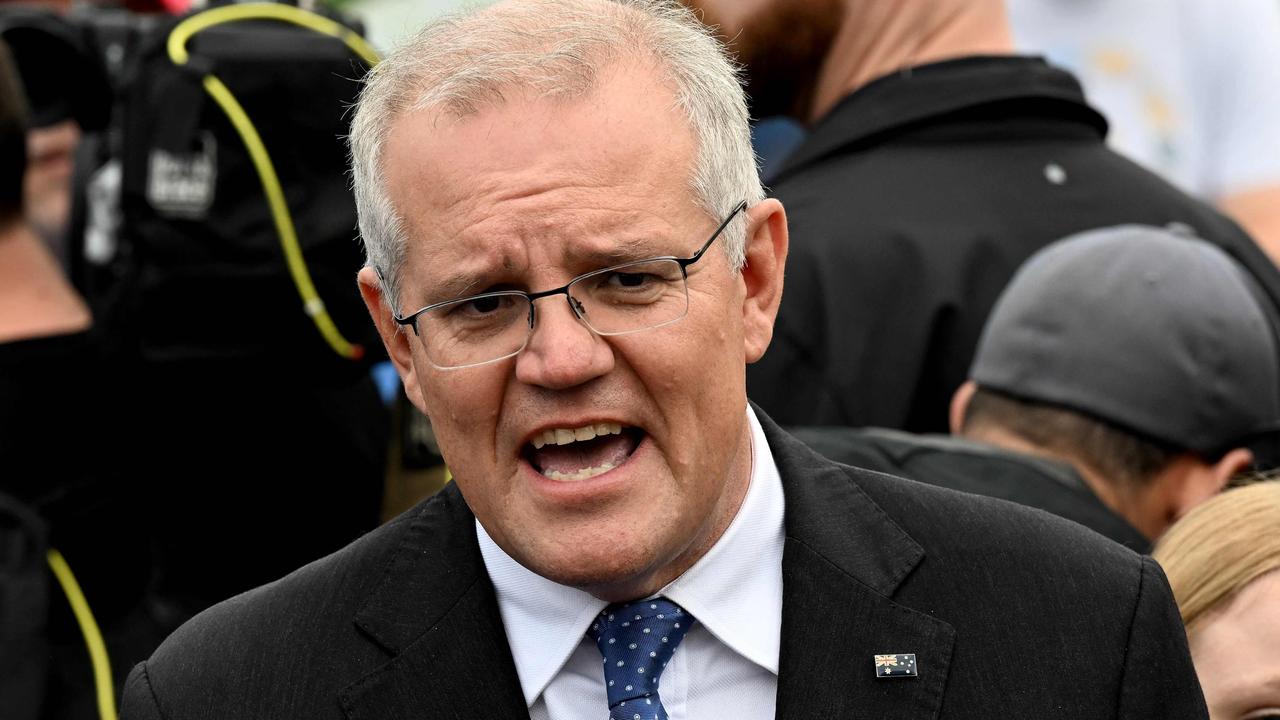Scott Morrison says he will stand down as leader but will stay in parliament
Scott Morrison has revealed he will stay in parliament after leading the Coalition to a horror election loss on Saturday.

Scott Morrison has confirmed he will stand down as leader of the Liberal party but will stay in parliament after conceding defeat in Saturday’s election.
Shortly before 11pm, Mr Morrison appeared before his supporters to confirm he had run Labor leader Anthony Albanese.
“Tonight I’ve spoken to the leader of the opposition and the incoming PM, Anthony Albanese, and congratulated him on his victory this evening,” he said.
He said he would “take responsibility for the wins and the losses — that is the burden and that is the responsibility of leadership.
“As a result, I will be handing over the leadership at the next party-room meeting to ensure that the party can be taken forward under new leadership, which is the appropriate thing to do,” he said.
However, Mr Morrison said he looked forward to continuing to serve his constituents in the Sydney seat of Cook.
“The people of Cook have supported me so strongly and I will continue to be your representative,” Mr Morrison said.
Mr Morrison also paid tribute to his deputy Josh Frydenberg, who looks as if he will lose his seat of Kooyong, and won’t be in the running to replace the PM.
Another frontrunner for the top job, Defence Minister Peter Dutton, is also a risk of losing his seat of Dickson, but is in better shape than Mr Frydenberg.
The concession comes after a horror night for the Coalition, which failed to hang on to seats including Wentworth, North Sydney and Goldstein.

Prior to the election, Mr Morrison was asked whether he would stand down as leader if he lost the election but told 7.30’s Leigh Sales on Monday: “I don’t speculate on things like that”.
When pressed on whether voters could “take it as a given” that he would stand down, the PM answered “no”.
“I’m not contemplating on that being the scenario,” he said.
However, in the case of a hung parliament, Mr Morrison was expected to face pressure to step down as independents like Zali Steggall have indicated she would be more likely to support the Coalition if he is not the leader.
Ms Steggall told the ABC last month she had “grave concerns in relation to Scott Morrison’s leadership”.
Respected political commentator Niki Savva, a former staffer to John Howard as well as Paul Keating, said she believed Mr Morrison would have been forced to step down as leader in the event of a hung parliament.
“If it comes to a choice for the Liberals, between holding on to government or holding on to Scott Morrison, they will dump him,” she told 7.30 on Thursday.
While Ms Savva said Mr Morrison would “probably be leader for life” if he had won the election with an increased majority, but if there was a minority government, she believed the Liberal party would act pretty quickly to remove Mr Morrison.
“You’ve got to remember that he’s about as popular inside the Liberal Party as he is outside the Liberal Party,” she said.

Prime ministers generally leave office after an election loss, although it’s not a requirement.
Former Labor prime minister Paul Keating retired from parliament shortly after he lost the 1996 election and his successor John Howard had no choice as he was voted out of his seat of Bennelong when the Coalition lost the 2007 election.
Other former prime ministers like Malcolm Turnbull left quickly after losing the leadership, with the Wentworth MP triggering a by-election in his seat after Scott Morrison claimed the top job ahead of the 2019 election.
More Coverage
But other prime ministers have decided to remain in parliament even after losing elections and their leadership.
Tony Abbott continued on as leader of the opposition after the 2010 election thanks to a better than expected result for the Coalition, and then went on to win the 2013 election. He never made it to the end of his term, being replaced by Malcolm Turnbull in 2015. He decided to stay in parliament as the local MP for Warringah for another term, but his constituents eventually booted him out in favour of independent Zali Steggall in 2019.
Kevin Rudd also stuck around after he was knifed from his position as prime minister, and even made a return as leader in 2013 but eventually left parliament after Labor was defeated at the 2013 election held months later.





